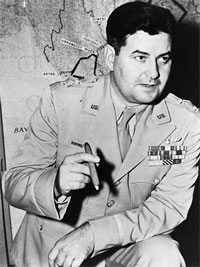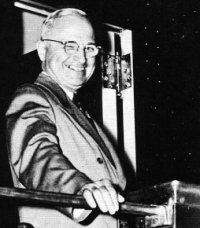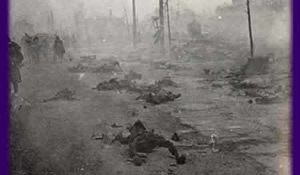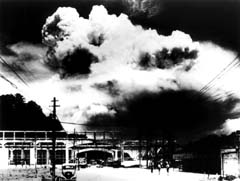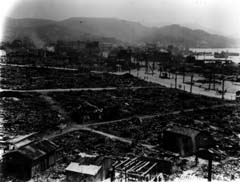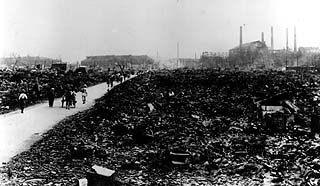Evildoers
For the past week, there’s been a lot of hubbub over All Things Beautiful’s Ten Worst Americans challenge. For a lot of reasons, I don’t have a comprehensive list, and I’m not that keen on the whole project (there’s lots of evil and ugliness in the world without going out of your way to seek it out, compile it, and cross-index it; I have no idea what the criteria would be for choosing ten people as more evil than any others; and I think that most of us are already far too fascinated with and fixated on demonology as it is). So I don’t have a Worst Ten list to provide. But I do have a list of additions that I think ought to be there, if lists are to be made. Coming out for the left-liberal corner we have Ampersand at Alas, A Blog (2005-12-27) with a list of seven villains, Patrick at Tiberius and Gaius Speaking… with a list of ten, and Glenn Greenwald and Hypatia at Unclaimed Territory (2005-12-28) with another ten to throw on the barbie. With the exception of Glenn’s silly inclusion of Harry Blackmun, they are pretty much right, as far as it goes, but there are some notable names that I notice tend to get left out. I suggested some additions at Alas and some dishonorable mentions at Tiberius and Gaius, which have been followed up with some debate.
Here’s my contribution of evildoers. I make no attempt to be comprehensive — there are lots of truly rotten people who aren’t on the list, mainly because they are mentioned elsewhere. But these folks are truly rotten, and often overlooked — sometimes because they get shoved out of the way by contemporary contenders that contemporary writers tend to give disproportionate space to, sometimes because the villains are overlooked by pop history anyway, and sometimes simply because political blinders prevent their names from being given serious consideration. The interesting thing is that the blinders rarely constitute defenses of their deeds — although in at least two of the three cases I discuss with Patrick that is what’s happening. It’s just that, for whatever reason, some folks whose crimes are readily admitted, if mentioned, aren’t thought of when you sit down thinking Who should I put down as a terrible evil-doer?
I have some ideas about the reasons behind that, but I’d be interested to hear what you think in comments, too.
In any case, here’s my unordered list of overlooked evildoers, cobbled together from my suggestions elsewhere:
Harry S. Truman. He ordered or approved the murders of 500,000 – 1,000,000 Japanese civilians over the course of half a year in 1945.
Curtis LeMay. He carried out the murder of 500,000 – 1,000,000 Japanese civilians over the course of half a year in 1945. He planned and carried out the low-altitude firebombing of Kobe, Tokyo, and 65 other Japanese cities. A nuclear maniac who explicitly denied that there were any innocent bystanders in war, went on to coin the phrase
bomb them back into the Stone Age
(in reference to the Vietnam War), and went on to become George Wallace’s running mate in 1968, on a platform of white supremacy and more militant anticommunism. During World War II, he repeatedly indicated his belief that the Japanese deserved wholesale slaughter of civilians, and his own public statements and the reminiscences of the soldiers who served under him reveal him as simply reveling in death and destruction.Franklin Delano Roosevelt, a pseudo-leftist demagogue who created the military-industrial complex; imprisoned political opponents; seized sweeping censorship powers; pandered to the worst sorts of racism, first in his political alliances with arch-segregationist Dixiecrats and then in whipping up war fever for war against Japan; ordered internment of Japanese-Americans; happily allied with, propagandized for, and consigned 1/2 of Europe to the totalitarian terror of, Joseph Stalin; and became one of the three men who came the closest to becoming a dictator in the United States.
Woodrow Wilson, unreprentant liar and war-monger, KKK fan, arch-segregationist, ardent anti-feminist. His published academic work delighted in white supremacist myth-making; his warmongering drew the United States needlessly into one of the worst and most senseless wars in world history; he built a slave army with the second federal draft in American history, and shredded civil liberties with abandon, happily imprisoning political opponents both during and after the War and presiding over the devastating Palmer Raids. Wilson is one of the three men who came the closest to becoming a dictator in the United States.
George Fitzhugh, who fused the worst elements of statist utopian socialism with a nostalgic view of feudal hierarchy to provide the most militant theoretical defense of white supremacy and race slavery in the prewar South. He authored Slavery Justified, Sociology in the South, and Cannibals All!.
William Tecumseh Sherman, one of the inventors of modern scorched-earth warfare, ravager of the South and murderer of Southern civilians. Sherman followed up his most famous role by pursuing genocidal campaigns against the Plains Indians and Indians in the Southwest from 1869 until his retirement in 1884.
James Eastland, the militant white supremacist Senator from Mississippi, mad dog McCarthyist, and founding father of the White Citizens Councils.
In addition to another Alas commenter’s suggestion of Larry Flynt, I’d also like to add Chuck Traynor, the pimp / pornographer / rapist / batterer / slave-driver who forced Linda Boreman into Deep Throat (among other pornography) and played an instrumental role in founding the mass-market, above-ground film pornography industry in the U.S. through repeated filmed rapes.
Sergio Méndez reminded me that Ronald Reagan certainly needs a mention, yet he seems notoriously absent from many of the lists. I mention him here not because I think he’s often overlooked on lefty lists of rotten people, but rather because I think the primary reasons to include him — his complicity in the formation of the death squads of El Salvador and the plainly genocidal massacre of some 200,000 Indians in Guatemala — is often overlooked in favor of a frankly silly focus on his contributions to the rhetoric of the contemporary Right in America.
The exercise, whatever its demerits, does seem to be a good conversation-starter. What do you think?

